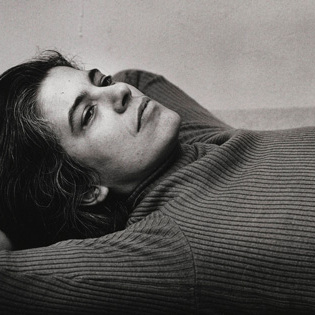它们一颗接一颗,滚落在我脚边......

死亡
是种艺术,和其他艺术一样。
我极擅此道。

“我看见自己坐在无花果树杈上,饿得要死,因为我始终打不定主意该摘哪些果子。我每一颗、每一个都想要,但是选定一个就意味着失去了其他,于是,当我坐在那儿,无法拿定主意时,无花果开始皱缩发黑,然后,它们一颗接一颗,滚落在我脚边......”(“I saw myself sitting in the crotch of this fig-tree, starving to death, just because I couldn’t make up my mind which of the figs I would choose. I wanted each and every one of them, but choosing one meant losing all the rest, and, as I sat there, unable to decide, the figs began to wrinkle and go black, and, one by one, they plopped to the ground at my feet.”)

“The Bell Jar”(《钟形罩》)被认为是西尔维亚·普拉斯(Sylvia Plath)创作的唯一一本小说,(直到不久前学者、评论家Judith Glazer-Raymo在翻阅普拉斯的档案材料时意外发现了她在大学期间创作的小说“Mary Ventura and the Ninth Kingdom”,这本成功幸存下来的小说于今年1月22日在Amazon正式上架销售)<Mary Ventura and the Ninth Kingdom,Publisher:Harper Perennial [January 22, 2019]>书中女主人公Esther Greenwood的生活轨迹和普拉斯惊人地重合,她在这本半自传的小说里赤裸地展现了一个女性从身体到精神双重崩溃的过程。小说结尾,在精神病院经历了一系列电击疗程后,Esther觉得自己有所好转,并重新获得了心灵的自由,她说“I was my own woman.” 紧接着却又说“The next step was to find the proper sort of man.” 叙事在Esther惶惶不安地坐在等候区准备进行出院测试时戛然而止,我们无法得知她是否通过测试“痊愈出院”,但现实给出了答案:作者在这本小说正式出版后一个月,于家中自杀,年仅31岁。

西尔维亚·普拉斯被认为是美国20世纪最重要女诗人之一,是“自白派诗歌”(Confessional poetry)的代表人物。“自白派”诗人热衷于以自白式的口吻关切“自我”的内心体验,检视内在的精神状态乃至极端的心理创伤,鼓励将写作的触角延伸至病态、死亡、性爱等禁忌领域,以极端坦诚的姿态巨细靡遗地捕捉隐藏于内心的一切,包括阴暗与邪恶。普拉斯的诗歌时常处理关于恐惧、伤痛、死亡、肉体、欲望的主题,作为后现代诗歌的分支,Confessional Writing成功地展现出20世纪上半叶美国青年的精神伤痕,一种迷茫、无序、痛苦的时代禀气,而在这种精神剧烈摆荡的无根状态下,女性所经受的来自传统、制度、风俗乃至宗教上的规训则显得更加令人难以喘息。
在“The Bell Jar”中,普拉斯用极具诗意的语言和敏锐的触角翻检内心每一丝微弱的颤动,女性在这大而无当的男权社会中被逼到了角落里,蜷缩在暗影下,仿佛隐形一般,彼此照应不见。“I thought the most beautiful thing in the world must be shadow, the million moving shapes and cul-de-sacs of shadow. There was shadow in bureau drawers and closets and suitcases, and shadow under houses and trees and stones, and shadow at the back of people’s eyes and smiles, and shadow, miles and miles and miles of it, on the night side of the earth.”
这些融化在社会历史背景中,不具清晰轮廓和生动面容的女性,她们的人生指向的不是未来,而是家庭。“What a man is is an arrow into the future and what a woman is is the place the arrow shoots off from.”“What I hate is the thought of being under a man’s thumb, a man doesn’t have a worry in the world.”



Esther在男友Buddy Willard工作的医院观看产妇生产让她第一次意识到女性的身体是如何在这个男性社会编织的谎言中被绑架的。“The woman’s stomach stuck up so high I couldn’t see her face or the upper part of her body at all. She seemed to have nothing but an enormous spider-fat stomach and two little ugly spindly legs propped in the high stirrups, and all the time the baby was being born she never stopped making this unhuman whooing noise.”
看不见脸的产妇发出非人类的叫声,Esther意识到了女性被割裂的身份和极具实用主义的”工具”特质。这种割裂在阿特伍德《侍女的故事》的叙述中无处不在—被剥夺的子宫和独立的女性意识。
当她得知男友,这个从小到大人们交口称赞的乖乖男竟然并非是个书呆子,早已和看护自己的护工发展出一段固定的性爱关系时,这个世界天真无辜的面目被无情撕破,现实刺痛了她。“my virginity weighed like a millstone around my neck. It had been of such enormous importance to me for so long that my habit was to defend it at all costs. I had been defending it for five years and I was sick of it.

西尔维亚·普拉斯与丈夫泰德·休斯(Ted Hughes)

贞洁、婚姻、家庭共同编织成一道笼驯女性的网,她渴望通过写作获得独立的人格和稳固的社会身份,而当实习期临近结束,成为作家无望时,这道网开始越收越紧,越发令人难以喘息。“I saw the days of the year stretching ahead like a series of bright, white boxes, and separating one box from another was sleep, like a black shade. Only for me, the long perspective of shades that set off one box from the next had suddenly snapped up, and I could see day after day glaring ahead of me like a white, broad, infinitely desolate avenue.”她的人生只剩无尽的荒凉与空白。
当她从纽约回到家时也是从幻想坠入现实的时刻。她看到了女性的生存现实——走样的身材、不修边幅的衣着,在慵懒漫长的午后推着婴儿车,身后跟着一串蹒跚学步的孩子,院子里散乱变形的玩具就像她们破碎凑泊的人生,填满漫长而无意义的生命。她们鼓胀着紧绷圆润的腹部,舞动纤细的四肢,发出尖锐非人的号叫,诞下绝望而生生不息的恶果。在卡伦·罗素(Karen Russell)的短篇小说“Orange World”中,母亲为了襁褓中的婴儿与怪物缔结协约,强忍痛苦,用自己的乳汁哺育饥饿的怪兽。天真无邪的婴儿与丑陋乖邪的怪物成为一奶同胞,他们贪婪地吮吸着母体的汁液,攫取她的生命与养分,直至她最终成为被嚼剩的生命残渣。
对于女性而言,这无疑是一种潜藏在她们内心深处的共同的梦魇,是压抑得令人无法喘息的“钟形罩”。西尔维亚以自白式的写作一刀接一刀地剜剐自己的内心,一层又一层地刮取痛楚的余屑,捧到读者面前。


然而她的叙述却又渗透出一种出人意料的疏离与冷静,仿佛她与世界,乃至与生命本身隔着一层罩子。每个人都是一座牢筑的城墙,不可攻破。她在人与人的牢笼,医院与医院的隔离间辗转、哀嚎、痛诉、惶恐。无论是在精神病院中接受电击疗法时的痛苦还是之后几次尝试自杀时内心的绝望,都带有一种超乎寻常的理性与冷漠,甚至她还极端冷静地分析起日本人剖腹自杀时的情形:“They disembowelled themselves when anything went wrong. I tried to imagine how they would go about it. They must have an extremely sharp knife. No, probably two extremely sharp knives. Then they would sit down, cross-legged, a knife in either hand. Then they would cross their hands ,and point a knife at each side of their stomach. They would have to be naked, or the knife would get stuck in their clothes.”
当第一次打算在浴缸中割腕自杀时,她谨慎地计算着血液耗尽的时间与母亲下班归来的时间;计划悬梁自尽时,她在脖子上缠上绳子,在屋子四处寻找房梁无果......
当然,这种冷漠也体现在她独特的观察与叙述方式上。母亲带着她第一次到精神病院咨询医生时,她坐在车上以一种置身事外的、冰冷、僵硬的口吻写道,“I watched my mother grow smaller and smaller until she disappeared into the door of Doctor Gordon’s office building. Then I watched her grow larger and larger as she came back to the car.”在第一次自杀失败后,母亲和哥哥带着Esther转往另一所医院接受治疗,她并未觉得亲人的存在是关怀或陪伴,“I sat in the middle of the back seat of the Cadillac, my mother on one side of me, and my brother on the other, both leaning slightly forward, like diagonal bars, one across each car door.”他们一左一右地坐在Esther身边,在她看来像是两根牢固的封条。


西尔维亚对“死亡”有着异乎寻常的痴迷,她一次接一次地透过描绘死亡乃至践行死亡实现生命的裂变与重生,她在生存的梦魇中求死,在死亡的艺术中求取生存的可能。在小说的最后Esther说,“这世界本身就是一场梦魇”。无花果树在《钟形罩》中是一个很重要的意象,Esther不止一次地提到它,读者看到她在故事最初生命的饱满绽放,及至后来渐趋枯萎衰竭,就像她眼睁睁看着生命的浆果一颗接一颗发黑、腐烂、最后滚落在脚边......
Dying
Is an art, like everything else.
I do it exceptionally well.
死亡
是种艺术,和其他艺术一样。
我极擅此道。
——西尔维亚·普拉斯《拉撒路夫人》
(Lady Lazarus)